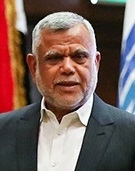Hadi al-Amiri
Hadi al-Amiri | |
|---|---|
 | |
| Member of Parliament | |
| Assumed office 1 July 2014 | |
| Minister for Transport | |
| In office 21 December 2010 – 8 September 2014 | |
| Prime Minister | Nour al-Maliki |
| Preceded by | Amer Abdoljalil |
| Succeeded by | Baqir Jabr al-Zubeidi |
| President of the Badr Organization | |
| Assumed office 16 July 2009 | |
| Preceded by | Baqir Jabr al-Zubeidi |
| Personal details | |
| Born | 1 July 1954 (age 66) Diyala, Iraq |
| Political party | |
| Other political affiliations | File:ائتلاف الفتح.jpg Fatah Alliance |
| Alma mater | University of Baghdad |
| Military service | |
| Allegiance | |
| Branch/service | File:Popular Mobilization Forces (Iraq) logo.jpg Popular Mobilization Forces |
| Years of service | 1982 - |
| Rank | Commander |
| Unit | File:Badr Organisation Military flag.svg Badr Brigade |
| Battles/wars | Iran–Iraq War 1991 uprisings in Iraq
Battle of Tikrit |
Hadi al-Amiri (هادي العامري) is the head and secretary general of the Badr Organization, a Shiite organization, considered a terrorist by the United States, sponsored by Iran and based in Iraq.[1] Born in Diyala province in 1954. A member of the United Iraqi Alliance, he heads the Shiite political organization Badr and his armed group, the Badr Brigade.
Biography
Hadi al-Ameri took refuge in Iran until the fall of Saddam Hussein. There he participated in the founding of the Badr Brigade, an armed wing of the Supreme Council for the Islamic Revolution in Iraq, a Shiite political party which fought the Iraqi regime during the Iran-Iraq war of 1980 - 1988.[1]
Al-Ameri also has a history of inciting sectarian violence in Iraq.
During a period of heightened violence between 2004 and 2006, he reportedly ordered attacks against the Sunnis. According to a cable leaked by the US State Department, "one of al-Ameri's preferred methods of killing involved the use of an electric drill to pierce the skulls of his opponents".
Amiri has denied claims that he has overseen flights passing through Iraqi airspace from Iran to Syria containing shipments of weapons to help the Syrian Government in the Syrian Civil War.[1] However, he has proclaimed his affection for Qassem Suleimani, the late commander of Quds Force, a division of the Islamic Revolutionary Guard Corps, who was believed to have been playing an instrumental part in supporting Syrian President Bashar al-Assad in the conflict.[1]
He was the commander of Iraqi forces in the operation to liberate Jurf Al Sakhar during 2014 Iraqi conflict.[2] As a commander in Popular Mobilization Forces, he has been active in the operations against ISIL. He has been described as "perhaps the most powerful and pro-Iranian" leader in the Popular Mobilization Forces and often meets with Brett H. McGurk President Donald J. Trump's US Special Presidential Envoy for the Global Coalition to Counter ISIL.[3] He is fluent in Persian.[4]
In 2011, he accompanied the Iraqi Prime Minister Nouri al-Maliki on a visit to the White House during Barack Obama's presidency, in his capacity as Secretary of Transportation and also as a foe of (former Iraqi president) Saddam Hussein.[5][6]
On 31 December 2019, along with Abu Mahdi al-Muhandis, Qais Khazali, and Falih Alfayyadh, he was identified by Secretary of State Mike Pompeo as a leader of the attack on the United States embassy in Baghdad.[6] In the aftermath of the 2020 Baghdad International Airport airstrike which resulted in the deaths of Qasem Soleimani and al-Muhandis, al-Amiri was seen as a candidate to replace al-Muhandis as a leader of the Popular Mobilization Forces,[7] an Iraqi coalition of militias which fought against the Islamic State of Iraq and the Levant terrorist group.
Since the start of major protests or the uprising against corruption of men and ruling religious parties, which was sparked on October 1, 2019, social networks have never ceased to mention the role of Al-Ameri and his Militia Badr, also of Qais Al-Kazali and his militia Asaib Ahl al-Haq, in the organization of the repression, the assassination and the kidnapping of the demonstrators.
References
- ^ a b c Dexter Filkins, Dexter (30 September 2013). "The Shadow Commander". The New Yorker. Retrieved 27 September 2013.
- ^ Morris, Loveday; Salim, Mustafa (25 October 2014). "Iraqi forces press to secure Shiite south before religious observances believed to be target of Islamic State". The Washington Post. Retrieved 2016-11-04.
- ^ "As Islamic State withers, the alliance against it is fraying". The Economist. 31 August 2017. Retrieved 3 September 2017.
- ^ "America and Iran are jostling for influence over Iraq". The Economist. 12 April 2017. Retrieved 21 April 2017.
- ^ "Leader of U.S. Embassy siege in Iraq was guest of Obama at White House". The Washington Times. 2 January 2020.
- ^ a b "US embassy siege leader was guest at White House during Obama presidency". Al Arabiya English. 2020-01-03.
- ^ Aboulenein, Ahmed; El Dahan, Maha (2020-01-03). "Large crowds mourn Iranian general, others killed in U.S. air strike". Reuters. Archived from the original on 2020-01-04. Retrieved 2020-01-04.
